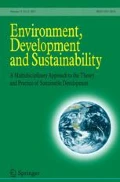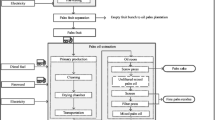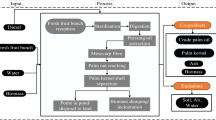Abstract
The crude palm oil industry plays an important role in the economic development of Thailand and in enhancing the economic welfare of the population. Despite obvious benefits of this industrial development, it also significantly contributes to environmental degradation, both at the input and the output sides of its activities. On the input side, crude palm oil mills use large quantities of water and energy in the production process. On the output side, manufacturing processes generate large quantities of wastewater, solid waste/by-products and air pollution. Current industrial wastes and recoverable materials are empty fruit bunches, fibers, shells and ash. It is estimated that in 2003, a total of 2.1 million ton of solid wastes/by-products and 2.5 million m3 of wastewater were generated. The concept of the industrial ecosystem points at the potential of industrial waste recycling resembling food chains, food webs and nutrient cycles of nature. Following the notion of industrial ecology crude palm oil mills can develop a number of waste recycling and reuse systems. This paper analyzes the nature of these industrial ecosystems, divided in in-plant ecosystems (clean technology options) and external waste exchange between crude palm oil industries and other economic activities in Thailand.
Similar content being viewed by others
Abbreviations
- BOD:
-
Biological oxygen demand
- CPKO:
-
Crude palm kernel oil
- CPO:
-
Crude palm oil
- EFB:
-
Empty fruit bunches
- FFB:
-
Fresh fruit bunches
- GHG:
-
Green house gases
- POME:
-
Palm oil mill effluents
- TKN:
-
Total Kjeldahl nitrogen
References
Allenby B.R., 1999, Industrial Ecology: Policy Framework and Implementation Prentice Hall New Jersey
Ayres, R.U. and Simonis, U.E.: 1994, Industrial Metabolism: For Sustainable Development, United Nations University Press
Biomass One-Stop Clearing House (BOSCH) 2004, Biogas production from palm oil mill effluent using completely stirred tank reactor Journal of Energy Policy and Planning Office 61: 36–41
Chiu A.S.F., Yong G., 2004, On the industrial ecology potential in Asian developing countries Journal of Cleaner Production 12(8–10): 1037–1045
Frosch, R.A. and Gallopoulos, N.E.: 1989, Strategies for Manufacturing, Managing Planet Earth, Scientific American Special Issue; September 1989, pp. 97–108
Graedel T.E., Allenby B.R., 1995, Industrial Ecology Englewood Cliffs, Prentice Hall New Jersey
Husin M., Ramli R., Mokhtar A., Hassan W.H.W., Hassan K., Mamat R., Aziz A.A., 2003, Research and development of oil palm biomass utilization in wood based materials Palm Oil Development 36: 1–5
Kittikun H., et al. 1996, Thai-German Project on Palm Oil Industry, PN91.2070.0-01.100 Prince of Songkhla University Thailand
Kochapansunthorn, S.: 1998, Development of a Simulation Model for the Anaerobic Biochemical-Reactor for Producing Biogas from Wastewater of Palm Oil Extraction Plant, Thailand, Chulalongkorn University Master’s Thesis
Minsirinun, K.: 1999, Deposition of Zinc in Activated Carbon from Anthracite and Palm-Oil Shell Activated by Zinc Chloride, Thailand, Chulalongkorn University Ph.D. Thesis
Panyawathanakit, P.: 1997, Production Activated Carbon from Palm Oil Shell: Activated by Superheated Steam, Thailand, Mahidol University Master’s Thesis
Ramli R., Sitaler S., Jamaludin M.A., 2002, Properties of medium density fibreboard from oil palm empty fruit bunches fiber Journal of Oil Palm Research 14: 34–40
Roberts B.H., 2004, The application of industrial ecology principles and plannin guidelines for the development of eco-industrial parks: an Australian study Journal of Cleaner Production 12(8–10): 997–1010
Suravattanasakul, T.: 1998, Production of Activated Carbon from Palm Oil Shell by Pyrolysis and Steam, Thailand, Chulalongkorn University Ph.D. Thesis
Unapumnuk, K.: 1999, Solid Waste Management in Palm Oil Mills: A Case Study in Thailand, Thailand, Asian Institute of Technology Master’s Thesis
USEPA (1992) Facility Pollution Prevention Guide. Office of Research and Development Washington, D.C. EPA EPA/600/R-92/008
Acknowledgements
This research is generated from academic cooperation between Wageningen University, the Netherlands, and the National Center for Hazardous Waste Management, Thailand. Generous support was obtained from Wageningen University under the North–South Interdisciplinary Research and Education Fund (INREF)/Agro-Industrial Transformation towards Sustainability; Southeast and East Asia in Global Perspective (AGITS) Project.
Author information
Authors and Affiliations
Corresponding author
Rights and permissions
About this article
Cite this article
CHAVALPARIT, O., RULKENS, W., MOL, A. et al. OPTIONS FOR ENVIRONMENTAL SUSTAINABILITY OF THE CRUDE PALM OIL INDUSTRY IN THAILAND THROUGH ENHANCEMENT OF INDUSTRIAL ECOSYSTEMS. Environ Dev Sustain 8, 271–287 (2006). https://doi.org/10.1007/s10668-005-9018-z
Accepted:
Published:
Issue Date:
DOI: https://doi.org/10.1007/s10668-005-9018-z




